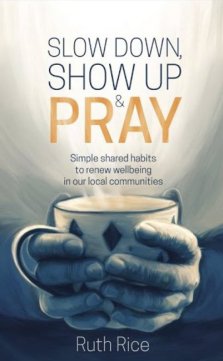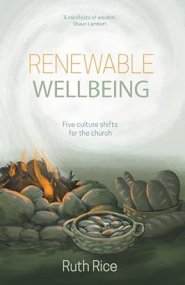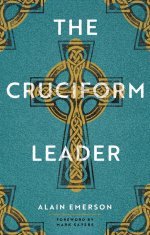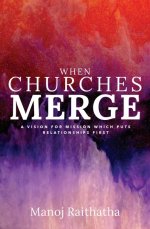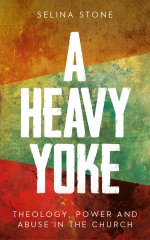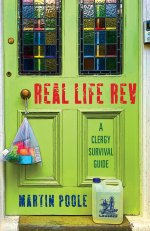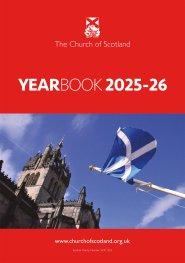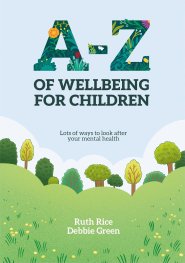Interview with Ruth Rice, author of Renewable Wellbeing
Wellbeing is at the very heart of the gospel but, in well-intentioned efforts to keep activities running, are over busy churches simply burning-out and missing the peace of Jesus? In her new book Renewable Wellbeing, Ruth Rice reveals how re-discovering the Jesus way of wellbeing is our best hope for a tired church in a broken world. Examining episodes from Jesus’ life, we are invited into simpler, safer and more sustainable ways of being church in a world in need of communities of wellbeing.
Ruth Rice is Director of Renew Wellbeing, a charity which runs simple café style spaces attached to a quiet room where inner habits of wellbeing are shared. Ruth longs for every church to find ways to bring God’s peace onto the high street and open spaces for all to attend to their wellbeing.
Ruth, can you tell us a little about yourself?
I am an accidental author and Director of a charity called Renew Wellbeing. These books have arisen out of my fascination with wellbeing which in turn grew out of a season of poor mental health and some experiments in recovery. I live in Nottingham with my husband Mark and little dog Beau. We have 3 grown up kids who, together with their partners and increasing number of grandchildren, keep us busy and bring us lots of joy. Born and bred on the Isle of Man I love the sea and am partial to a bit of wild swimming. I moved to Nottingham for a teaching job in the eighties, met Mark and have been landlocked here ever since. I left teaching to lead a little Baptist church in 2009 having suffered with serious burn out. This difficult season proved to be the start of a new adventure as we established the first ever Renew Wellbeing space in 2015 in Nottingham in response to my own need to learn how to live with wellbeing. The charity Renew Wellbeing then formed in 2017 helping churches set up spaces where it is Ok not to be Ok: being present, prayerful and partnering with mental health services. There are now hundreds of Renew spaces across the UK and beyond. The story of this and the manual to set up a centre is in my first book Slow Down, Show Up and Pray. The second book The A-Z of Wellbeing gives some reflections on what wellbeing looks like.
Why did you decide to write Renewable Wellbeing?
Renewable Wellbeing grew out of a concern I had that as the charity grew, and more and more churches joined in setting up wellbeing spaces, that there was a danger of us getting even busier as churches and missing the point of Renew Wellbeing; the call back to simplicity, to prayerful habits and lives of shalom. So, this book takes us back to the gospel of wellbeing that I am being formed by as I follow Jesus and read the gospels.
This book is a plea to every church, every Christian, everywhere, to find the treasures of wellbeing and the ways of wellbeing in the stories of Jesus. Here are five culture shifts drawn from five stories in John’s gospel that I believe would bring health and life to any church serious about seeing wellbeing grow in their communities.
Why did you choose this title?
I didn’t choose this title to begin with! The book was called something else to start with, but I felt challenged by God to drop that title as it was critical of the church which is his bride, and he loves his bride too much to let me disrespect her. You can read about what that old title was and see my working out in the introduction to the book! I arrived at Renewable Wellbeing as this is what I believe I see at the heart of Jesus’ life and work. This is not quick fix wellbeing, this is peace that can be renewed every day and has a source that allows it to be renewable and sustainable. The shifts in culture that I address might bring churches into lifestyles that mean wellbeing doesn’t keep running out. I believe many of us are fuelled by unsustainable sources of energy and peace. I certainly was for many years.
Who have you written this book for?
This is a book aimed at every church, church leader, ordinary follower of Jesus that ever there was. But my hope is that the ways of Jesus could teach anyone with a pulse how to live more peacefully in their own skin. I really hope people of all faiths and none can find something hopeful in these pages for their wellbeing practices.
You talk about the ‘Jesus way of wellbeing’ – what do you mean by that?
Jesus is wellbeing. I think the thing people are looking for in their fascination with wellbeing is a sort of peace and wholeness, that is embodied in the person of Jesus. So, as we follow him through John’s gospel in this book, I draw out five particular values that he embodies that have helped me in my wellbeing journey. I explore the Jesus way to knowing your identity (who are you and who is God), finding your economy (what will you measure and why), being part of community (boundaried giving from what you have not what you think you should have), having habits of simplicity (shareable ways to deepen peace in prayer) and embracing vulnerability. All of these culture shifts are addressed by Jesus in his life, death and resurrection, I believe. Jesus knew who he was, valued the one, chose to share his life with others, lived out of deep rhythms of prayer and ultimately took the way of the cross: such vulnerability, such wellbeing lived out!
You use the language of food and picnics a lot in the book – why is this so important to you?
Well, I do love food! And a picnic is the ultimate meal for me … shareable, simple and easy to invite others to join in. But also, the image of picnics on a battlefield was a picture God gave me at the start of this adventure. I saw the issues around mental and emotional ill health close-up in my own life and then increasingly in a wider way as a sort of battlefield of despair and isolation that I felt so ill equipped to do anything about and so overwhelmed by. It was as I prayed and gazed on the battlefield that was claiming the lives of friends and the peace of so many, that God showed me a space on the battlefield, and in this vision a picnic rug appeared in the space and a basket full of good things to eat dropped from heaven and people started putting down their weapons and getting up off the battle floor and joining the picnic. As I looked behind me in the vision, picnic rug by picnic rug, the whole battle field was becoming a picnic site. Peace was replacing panic; love was displacing loneliness. I believe this is what we are seeing happen in this simple Renew movement. I think the image of the picnic reflects the words in Psalm 23 about God preparing a table in the presence of our enemies for us. I really think every church could be a place for sharing goodness and peace, a picnic for all if you like in the middle of an uncertain battlefield.
You have a vision for ‘a gentler, more Christlike way of living, worshipping, belonging and sharing the good news.’ What one bit of advice would you give to a church who wants to make a start to change in this direction?
One piece of advice? That’s tricky as no two churches are the same. I suppose remembering that we are not the fourth emergency service, we are a bunch of broken human beings who want to follow Jesus and love each other and our communities would be a good starting place. These culture shifts are designed to help us be authentic and honest about our own humanness as well as offering to share the habits that lead us into life. I suppose it would be ‘remember there is a God and it isn’t you!’
What was the most challenging element of writing this book?
The challenging part came in not sounding critical of the church. I just don’t want to do that. However concerned I was, and still am, about the overbusyness in many churches, I felt increasingly as I wrote that God really, really, really loves his church and does not have another plan … the local church is still the best bet for the renewing of wellbeing in our communities. That conversation with God became an ongoing battle as I wrote. I hope the book reads with compassion and not criticism.
And what was the most rewarding element of writing this book?
I loved writing this book. Each chapter was written in a different location that brought me deeper into God’s peace, mostly in shepherd’s huts. It felt like I was being called away by God to properly listen and reflect. It feels like everything I really believe as honestly as I can express it. But it also made me look more at Jesus than at Renew Wellbeing which was great.
Have you learnt anything new about your own personal journey with God while writing this book?
Oh yes … so much! I often feel I am writing just for me! It is such a privilege to write a book. I still don’t see myself as an author at all. But I am so grateful for the deeper insights that come through the rigour of the writing process. For me it was the chapter about community that has most challenged me. I am still addressing many of the issues that arose as I saw the feeding of the 5000 story in a different light and realised I could be the little boy hunkering down behind a rock with a picnic for one if I chose to, if I decided not to enter into community, not to share gifts. I am still challenged by this. No sharing, no miracle. It’s as simple as that. Community is vital. Local church is still God’s good idea. I still need to work out how to engage and not over commit. I love that these chapters are iterative, that is I will need to keep going back and having a bit more, delving a bit deeper, just like a picnic!
What do you hope readers will most get out of reading this book?
I so hope readers will see the deep unchanging love of Jesus and his beautiful ways of wellbeing in this book. Nothing more, nothing less.
In one sentence, how would you describe Renewable Wellbeing?
Renewable Wellbeing is an invitation to follow Jesus into deeper ways of wellbeing that will change our minds, homes, lives, churches and communities.
Is there anything we can pray for you?
Please pray that I remember to keep looking at Jesus for my own wellbeing, that I keep learning who I am, who he is, keep measuring the quality of the encounter not the size of the charity, keep being open to be part of community, that I keep steady with my rhythms of prayer and peace and keep vulnerable always, remembering I am still the project.

Trustpilot


